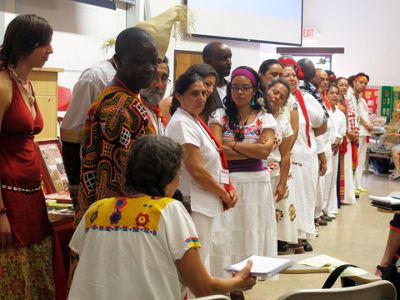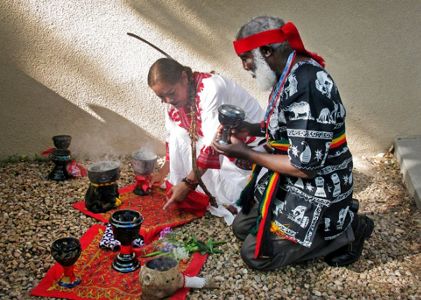ALBUQUERQUE, N.M. (AP) — A promotion around the movie "The Curse of La Llorona" using traditional Mexican healers for "spiritual cleansings" before screenings of the horror film is drawing strong criticism from healers and scholars who say the stunts are offensive and demeaning.
Leading up to the Friday release of the movie based on a Mexican folktale, Warner Bros. invited healers known as curanderos to give audiences cleanings called "limpias." The studio also dispatched Cuban-born, Los Angeles-based healer Salvador Gata to "bless" an audience before the March 15 premiere at SXSW at The Paramount Theatre in Austin, Texas.
In addition, photos posted on social media show images of supposed healers providing ceremonial cleansings in front of posters of "The Curse of La Llorona," then celebrating as if attending a party.
"I'm working on the movie La Llorona and am looking for a curandero to do limpias before my movie screenings," publicist Nahir Wold wrote San Diego-based curandera Grace Sesma in an email. "Let me know if this is something you would be interested in doing!"
Sesma said she ignored the invite until she started seeing photos of purported limpias at screenings online. That angered her and she posted the email on her Facebook page.
"I found it quite shameful," Sesma said. "It heightens the fear factor around a traditional practice and commodifies and exploits our culture just to get people to see their movie."
But Miguel Franco, a curandero based in Los Angeles, said Warner Bros. wasn't looking for stereotypes when the studio invited him several times at various events for the movie.
"Working at press junkets, offering my services to people from all walks of life, including several well-known people, influencers, and media has allowed me to share my gift with people who normally would not have sought me out," Franco said. He called the experience "overwhelmingly positive."
Wold did not immediately return emails and phone messages left by The Associated Press.
Tonita Gonzales, an internationally known curandera based in Albuquerque, called the promotion an "outrage and an appropriation" of Mexican American culture.
"The limpia is a cleansing that helps people see the holy that's within them," Gonzales said. "To us this to promote a movie, especially during (Easter Weekend), is disturbing."
The production hired curanderos as consultants to make sure the curandero in the film was portrayed accurately and with sensitivity, Warner Bros. officials said. The studio declined further comment.
"The Curse of La Llorona," starring Linda Cardellini and Raymond Cruz, centers on the Mexican folklore of La Llorona, a crying female spirit who takes children. Cruz, who plays a curandero and protector in the movie, is one of many Latino actors featured in a cast that includes comedian Paul Rodriguez and Marisol Ramirez, who plays La Llorona.
Curanderismo is the art of using traditional healing methods like herbs and plants to treat various ailments. Long practiced in Native American villages of Mexico and other parts of Latin America, curanderos also are found in New Mexico, south Texas, Arizona and California.
Anthropologists believe curanderismo remained popular among poor Latinos because they didn't have access to health care. But they say the field is gaining traction among those who seek to use alternative medicine.
A limpia is something performed for those suffering from trauma like sexual abuse, Sesma said. "It's not supposed to protect you from being scared at the movies."
University of New Mexico professor Eliseo "Cheo" Torres, who hosts an annual conference in Albuquerque on curanderismo, said the tale of La Llorona has nothing to do with curanderos, even if there are curanderos in the film. "I don't see the connection and this probably will be offensive to those practicing traditional healing," Torres said. "Whoever put this promotion together likely has no idea what they are doing."
Andrew Chesnut, the Bishop Walter F. Sullivan Chair in Catholic Studies at Virginia Commonwealth University and a scholar who has studied spiritual practices in Mexico, called the movie promotion "reprehensible" and harmful.
"It will only serve to further stigmatize curanderismo as something to be feared" since it's associated with a scary movie, Chesnut said. "That's dangerous, especially because of the climate that Mexican immigrants face right now."
___
Russell Contreras is a member of The Associated Press' race and ethnicity team. Follow him on Twitter at http://twitter.com/russcontreras
Copyright 2019 The Associated Press. All rights reserved. This material may not be published, broadcast, rewritten or redistributed.








